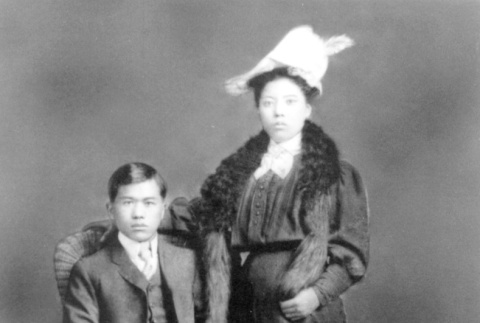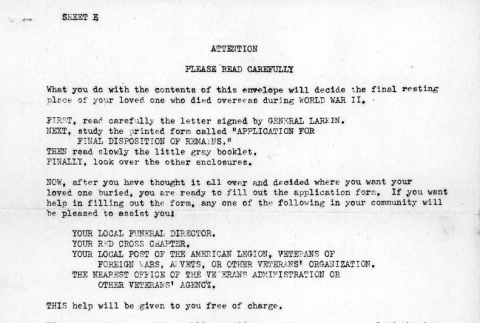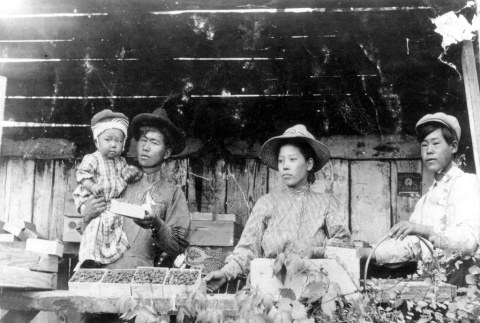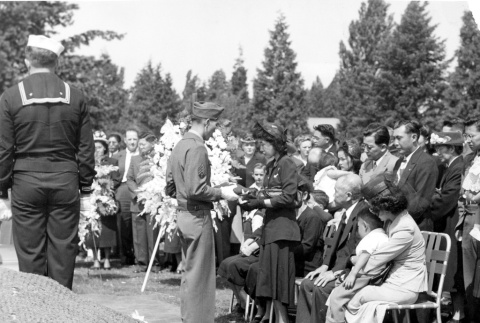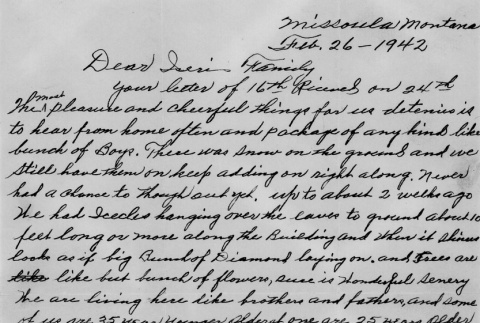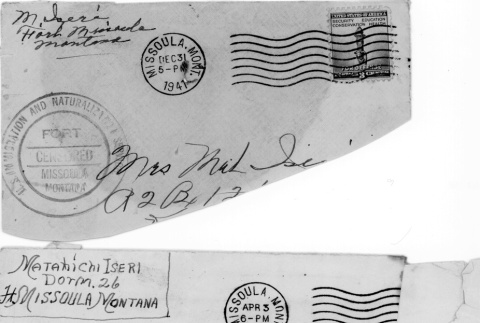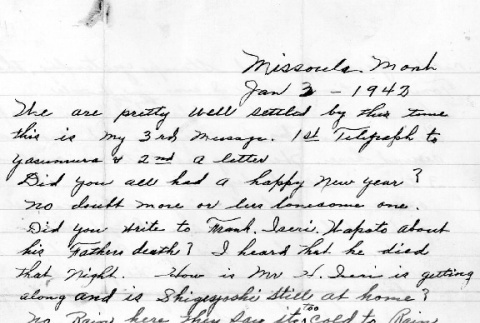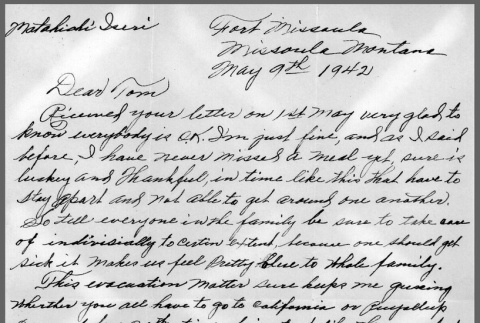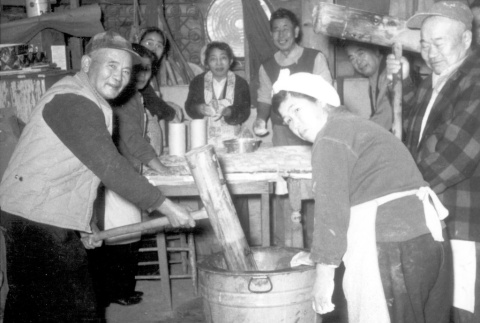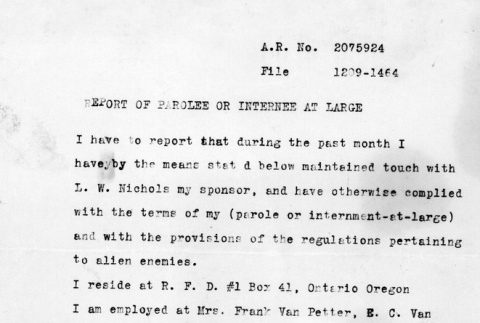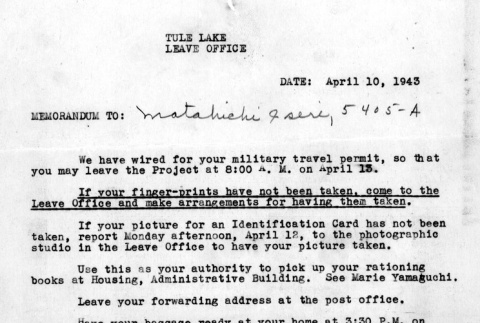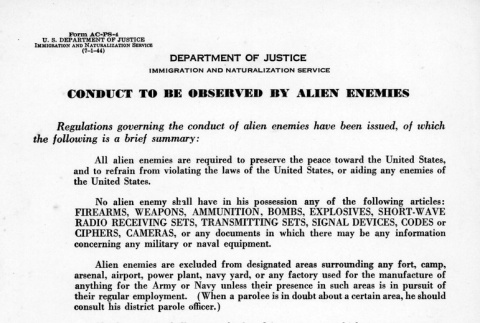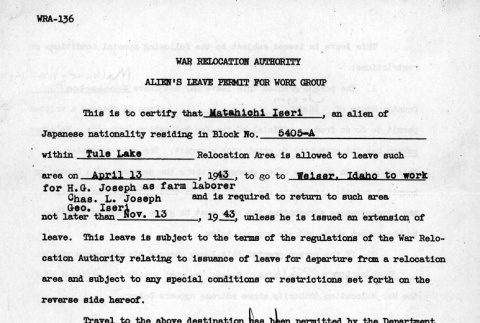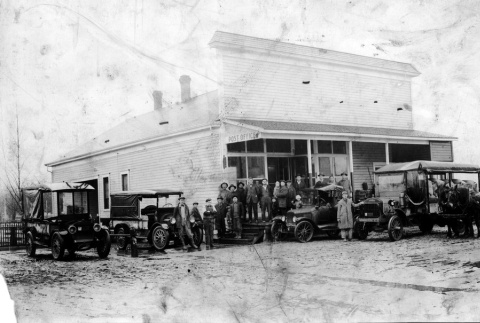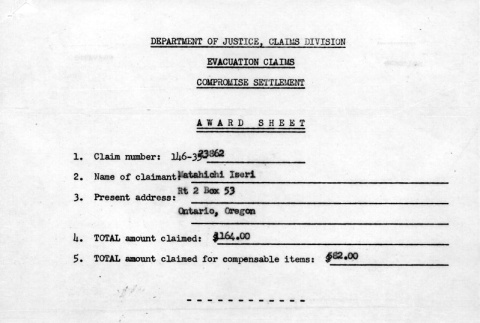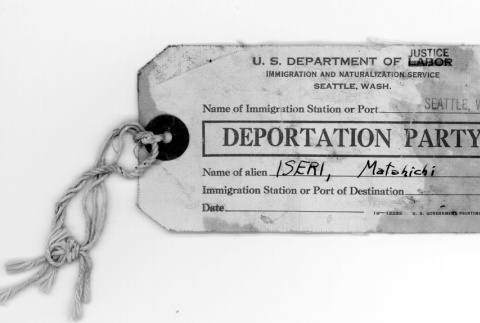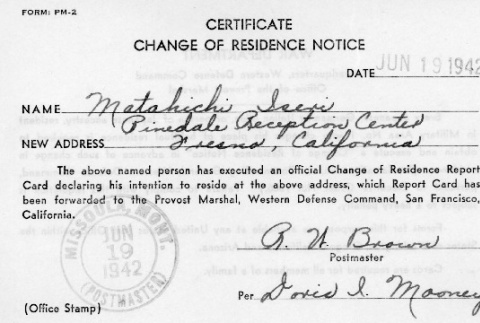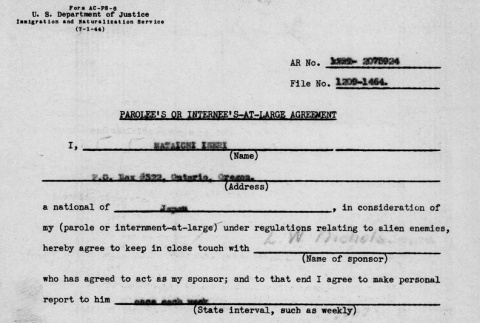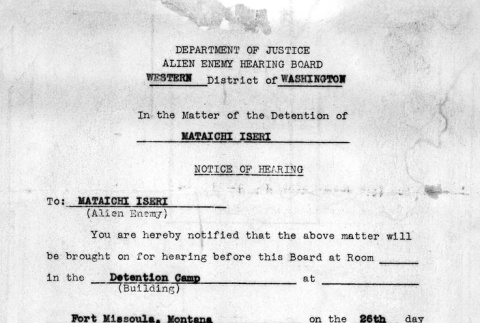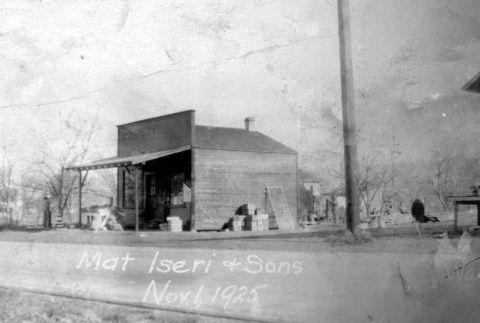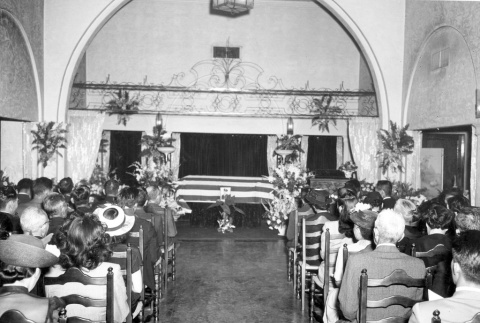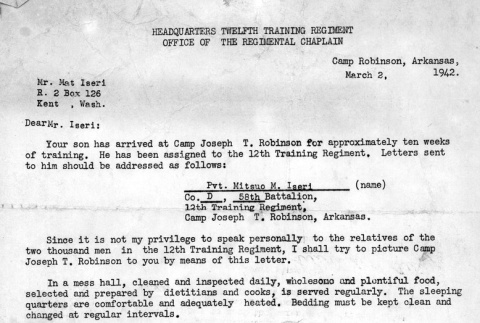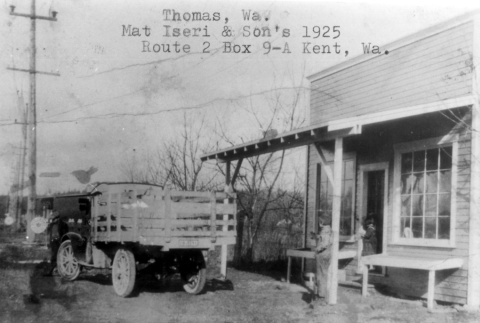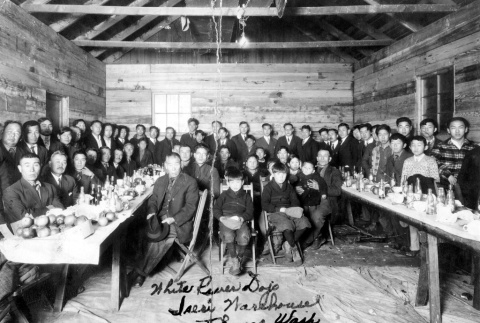44 items
- 1
- 2
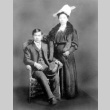
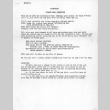
doc
Instructions to an Issei man regarding the burial of his son (ddr-densho-25-62)
Mitsuo (Mike) Iseri, son of Matahichi and Kisa Iseri, was killed in action during the war. Matahichi Iseri was instructed to fill out a form entitled "Application for Final Disposition of Remains."
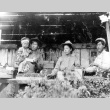
img
Packaging berries (ddr-densho-25-2)
Matahichi and Kisa Iseri leased a farm in Sumner and grew raspberries for various canneries. The wooden berry "cups" were handmade locally. Left to right: Matahichi Iseri carrying oldest son Tom, Kisa Iseri, and their nephew, Tsukasa Iseri.
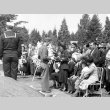
img
Burial of a Nisei soldier (ddr-densho-25-63)
Mitsuo (Mike) Iseri, son of Matahichi and Kisa Iseri, was killed in action during World War II.
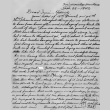
doc
Letter written by an Issei man (ddr-densho-25-70)
Matahichi Iseri had been imprisoned in Fort Missoula, Montana, a Department of Justice internment camp for "enemy aliens," since shortly after December 7, 1941. He sometimes wrote letters in his native Japanese, which were read and censored by interpreters and officials from the U.S. Immigration and Naturalization Service.
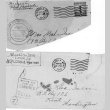
doc
Issei man's letter envelopes (ddr-densho-25-84)
These envelopes contained letters written by Matahichi Iseri to his family while he was imprisoned in Fort Missoula, Montana, a Department of Justice internment camp for "enemy aliens."
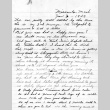
doc
Letter written by an Issei man to his family (ddr-densho-25-68)
Matahichi Iseri was arrested on December 7, 1941, and taken to Fort Missoula, Montana, where he was detained at a Department of Justice internment camp for "enemy aliens." While he was separated from his wife and children, he was able to send a limited number of letters to them.
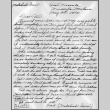
doc
Letter written by an Issei man to his family (ddr-densho-25-26)
While he was at Fort Missoula, Montana, a Department of Justice internment camp for enemy aliens, Matahichi Iseri wrote to his wife and children, who were still awaiting a relocation assignment from the WRA.

doc
"Disposition of World War II Armed Forces Dead" pamphlet (ddr-densho-25-119)
This pamphlet was sent to Matahichi Iseri following the death of his son, Private Mitsuo (Mike) Iseri, during World War II.
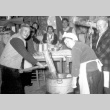
img
Mochitsuki (ddr-densho-25-136)
Matahichi Iseri (far right) and Mrs. Fujinaga (back to camera) were originally from the White River Valley in Washington. After their wartime incarceration, they resettled in Ontario, Oregon, with their families. They and friends are following the New Year's tradition of mochitsuki, making rice cakes. Clockwise from the left: Mr. Kanetomi, unidentified, Mrs. Morimoto, Mrs. Kanetomi, …
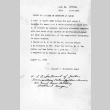
doc
Parolee report (ddr-densho-25-116)
In 1945, Matahichi Iseri lived in Ontario, Oregon, and reported to the Immigration and Naturalization Service.
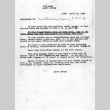
doc
Seasonal Work Leave permit for an Issei (ddr-densho-25-40)
Matahichi Iseri and his family participated in the Seasonal Work Leave Program, and were thus issued permits to become temporary laborers on a farm in Weiser, Idaho. This memo to Matahichi Iseri from the Tule Lake Leave Office detailed instructions for Matahichi's departure from Tule Lake to Weiser.
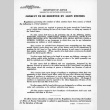
doc
List of regulations specifying conduct to be observed by "alien enemies" (ddr-densho-25-20)
Matahichi Iseri, considered a "dangerous enemy alien," was arrested on Dec. 7, 1941, and imprisoned in the Department of Justice internment camp at Fort Missoula, Montana. During the war, enemy aliens were not allowed to own contraband articles such as weapons, signal devices, and cameras. They were required to carry certificates of identification at all times, …
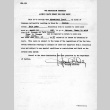
doc
Alien's leave permit (ddr-densho-25-34)
In April 1943, Matahichi Iseri and his family were granted permits to leave the Tule Lake concentration camp to go to Weiser, Idaho, as part of the seasonal work leave program. Because he was an Issei, Matahichi Iseri had to apply for a special permit.

img
The Leonard Store (ddr-densho-25-10)
The Leonard Store was an important business in the White River Valley. Leonard introduced modern conveniences such as post office boxes and phones to the community. He also catered to the local Nikkei and imported various goods from Japan. Matahichi Iseri, a prominent Issei, worked for Leonard who promised to make him a partner in the …
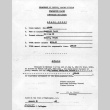
doc
Evacuation claims settlement sheet (ddr-densho-25-65)
Under the Japanese American Evacuation Claims Act, Matahichi Iseri claimed $246 in damages from losses due to World War II. In 1952, the Justice Department awarded him a compromise settlement of $226. He was fortunate to receive an amount so close to his original claim, since many Japanese Americans received much less.
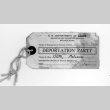
doc
Deportation tag (ddr-densho-25-32)
Matahichi Iseri received this deportation tag when he was sent to Fort Missoula, Montana, a Department of Justice internment camp for enemy aliens.
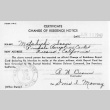
doc
Change of Residence Notice (ddr-densho-25-27)
Considered a "dangerous enemy alien," Matahichi Iseri was separated from his family and sent to the Department of Justice internment camp at Fort Missoula, Montana. In June 1942, he received a Change of Residence Notice certificate, which indicated that his request to join his family at the Pinedale Assembly Center in California had been approved.
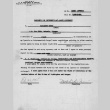
doc
Parole Agreement (ddr-densho-25-57)
On December 7, 1941, numerous Japanese nationals were arrested by the FBI as "enemy aliens." An alien enemy hearing board was created, which determined whether the aliens were to be released, paroled, or interned. Matahichi Iseri signed a Parole Agreement in which he agreed to the terms of his parole.
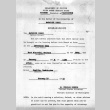
doc
Issei's hearing notice (ddr-densho-25-71)
Matahichi Iseri was arrested as an "enemy alien." Those arrested were required to appear before an alien enemy hearing board.
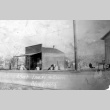
img
Issei-run store (ddr-densho-25-11)
Matahichi and Kisa Iseri ran a small store and berry farm in Thomas, Washington. Matahichi first opened the store in the family's garage shown here.
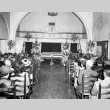
img
Funeral service for a Nisei soldier (ddr-densho-25-64)
Mitsuo (Mike) Iseri, son of Matahichi and Kisa Iseri, was killed in action during World War II. He was later buried in Seattle, Washington.
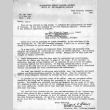
doc
Notification of a Nisei's induction into the military (ddr-densho-25-50)
Letter from the chaplain of the 12th training Regiment at Camp Robinson, Arkansas, to Matahichi Iseri. The letter describes Camp Robinson, where his son, Mitsuo (Mike), had been sent for military training. On January 23, 1942, the government decided to send Japanese American soldiers who were still in service to special camps in Arkansas and Alabama. …
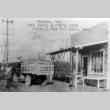
img
Issei-owned store (ddr-densho-25-9)
Matahichi and Kisa Iseri sold imported and dry goods from Japan as well as general merchandise to the Japanese American community in the White River Valley. When they started the business, the Iseris used their garage, as seen here. Later, they built a bigger store in front of their property.
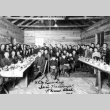
img
Opening celebration, White River judo dojo (ddr-densho-25-7)
Matahichi Iseri and his wife, Kisa, were very supportive of youth activities, and in 1927 they converted part of their warehouse into a judo dojo. This dinner was held to celebrate the opening of the dojo.
- 1
- 2
